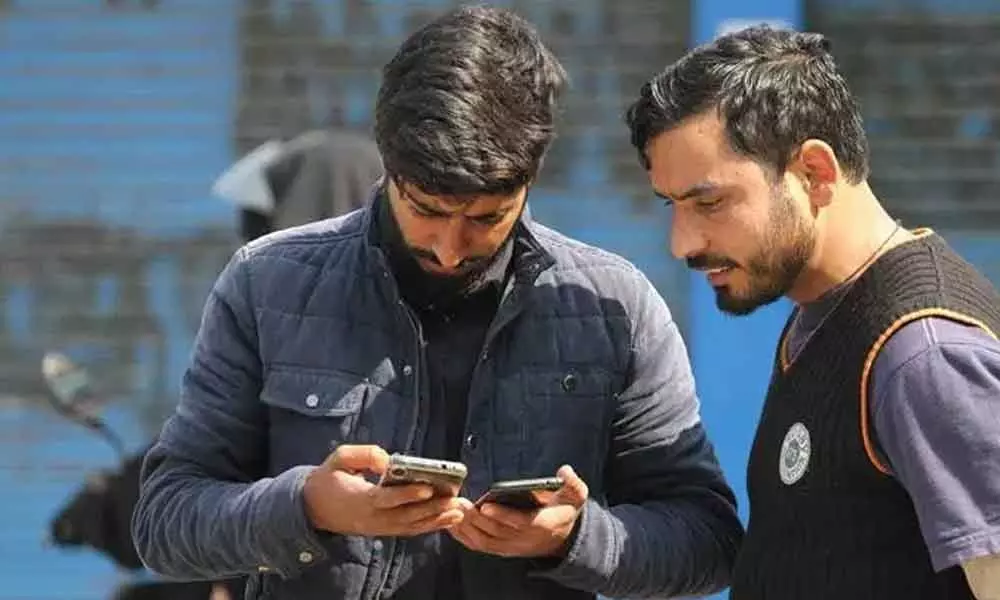Live
- Over 7,600 Syrians return from Turkiye in five days after Assad's downfall: minister
- Delhi BJP leaders stay overnight in 1,194 slum clusters
- Keerthy Suresh and Anthony Thattil Tie the Knot in a Christian Ceremony
- AAP, BJP making false promises to slum dwellers for votes: Delhi Congress
- 'Vere Level Office' Review: A Refreshing Take on Corporate Life with Humor and Heart
- Libya's oil company declares force majeure at key refinery following clashes
- Illegal Rohingyas: BJP seeks Assembly session to implement NRC in Delhi
- Philippines orders full evacuation amid possible volcanic re-eruption
- Government Prioritizes Welfare of the Poor, says Dola Sri Bala Veeranjaneyaswamy
- Two Russian oil tankers with 29 on board damaged due to bad weather
Just In
Shutting down mobile, landline, internet in J&K for 90 days not temporary measure


Shutting down mobile, landline and internet services for 90 days in Jammu and Kashmir was "by no means a temporary measure" following the abrogation of Article 370 of the Constitution, the Supreme Court was told on Wednesday.
New Delhi : Shutting down mobile, landline and internet services for 90 days in Jammu and Kashmir was "by no means a temporary measure" following the abrogation of Article 370 of the Constitution, the Supreme Court was told on Wednesday.
The orders passed by the IGP, Kashmir range, shutting down the telecommunications services in the state, were prima facie illegal as an officer of the home secretary's rank was authorised to pass such orders, a bench headed by Justice N V Ramana was told by lawyer Vrinda Grover, appearing in a case for Anuradha Bhasin, the executive editor of Kashmir Times.
Referring to the provisions of the Temporary Suspension of Telecom Services (Public Emergency or Public Safety) Rules, 2017 and the Indian Telegraph Act, Grover said, "The orders have been issued by the Inspector General of Police, Kashmir range.
But as per Rule 2(1), no one below the rank of the central or state home secretary has the authority to pass such orders." Referring to an additional affidavit filed by the Jammu and Kashmir administration, the lawyer said the landline services were snapped on certain grounds, including misuse of data services, and termed it "bizarre".
Bhasin has challenged the restrictions imposed in the valley and alleged that those violated the freedom of speech and expression of the press. "On the pretext of stopping misuse of data services, the state government shut down the landline services in the state," Grover said, adding that such kind of a communication blockade for a period of 90 days was "by no means a temporary measure".
At the outset, the lawyer said the orders passed by the administration were "without any application of mind", adding that one of those was for reducing the internet speed from 4G to 2G, but the internet was completely shut down in Jammu and Kashmir following the decision to abrogate Article 370.
"Is national security not a good ground for such a ban?," the bench, also comprising justices R Subhash Reddy and B R Gavai, asked. "As per the administration, the orders were passed on the ground of law and order and not on the ground of security of the state," Grover said, adding that the authorities were not apprehending "a threat to the security of the nation".
"Law and order is different from public order. If there was a law-and-order problem like a ruckus inside the Supreme Court complex, then a few cops can control it. Such a situation does not call for an information blackout," she said, adding that in Jammu and Kashmir, it was only an "apprehension" of a law-and-order problem.
Freedom of speech and expression was necessary for the press, the fourth pillar of democracy, Grover said. "Nowadays, the press seems to be the most important pillar, more powerful than the other three," the bench remarked. "I do not know, it does not seem to be that way at least in Jammu and Kashmir," Grover replied.
The lawyer concluded her submissions in the case on Wednesday. Earlier also, Grover had assailed the government's orders on restrictions on communications. She had said that even after 90 days, communication services -- data, internet, pre-paid mobiles and SMS -- were not fully operational in the Kashmir Valley, affecting the working of the media.
"There is an absolute communications shutdown from August 4. It requires to be tested by this court. Yes, there can be reasonable restrictions on the rights under Article 19 (of the Constitution), but the same cannot extinguish the right itself," she had said.
Bhasin had earlier told the bench that the Centre and the Jammu and Kashmir administration had suppressed from the top court the orders and notifications, on the basis of which physical and communication restrictions were imposed in the valley.
However, the Jammu and Kashmir administration had said those orders and notifications would be placed before the top court, but could not be shared with the petitioners.

© 2024 Hyderabad Media House Limited/The Hans India. All rights reserved. Powered by hocalwire.com






